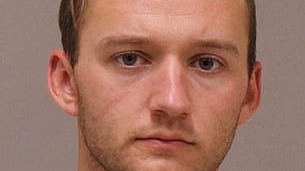FBI agent audio raises questions about sabotage in Whitmer kidnap case, defense suggests
 Robert Snell
Robert SnellA lawyer for an accused bombmaker charged in the Gov. Gretchen Whitmer kidnapping case raised questions Sunday about whether the FBI is trying to sabotage defense teams ahead of a landmark trial.
A filing by the attorney for Delaware resident Barry Croft revealed the existence of a recording Sunday in which the lead investigator, FBI Special Agent Henrik Impola, discussed creating "disarray and chaos" for defense lawyers, whom he labeled "paid liars."

Defense lawyer Josh Blanchard included excerpts from the recording in a court filing Sunday that asked U.S. District Judge Robert Jonker to have prosecutors produce a witness list by late August.
The request comes despite concerns about the safety of confidential informants and undercover FBI agents who helped infiltrate the alleged plot last fall — and whose names would be expected to appear on a witness list.
Defense lawyers are not entitled to witness lists in federal court though judges have discretion to demand the lists be shared before trial.

Blanchard cited an audio recording of Impola and an unidentified informant who described being afraid of his identity being made public. The recording was made in December during an apparent strategy session, Blanchard wrote.
"Having done this with a lot of sources, we can cloud the water," Impola told the informant. "And it can be completely — we can send everybody into disarray and chaos where the last thing they’re worried about is (the informant's name)."
It was unclear how defense lawyers obtained the audio and whether it was provided by the government along with evidence collected during the investigation.
In another excerpt Sunday, the FBI agent was quoted saying the “best chance is to create utter confusion and chaos” and also told the informant defense lawyers involved in the case were "paid liars" whose job was to “take the truth and portray it in a different sense."
An FBI spokeswoman could not be reached immediately for comment Sunday.
There is no indication the agent's intention to create "chaos and disarray" is shared by federal prosecutors, Blanchard wrote.
"However, it appears that his behavior has infected the discovery produced by the government as demonstrated by the disorganized and highly duplicative way it was produced," Blanchard wrote.
He pointed to certain files being shared with defense lawyers 16 times.
"One 40-minute audio recording was produced 15 times with 15 different file names," Blanchard wrote.
The request is the latest legal development in a high-profile case that has focused attention on anti-government extremism in Michigan amid fallout from lockdown orders aimed at stemming the spread of COVID-19.

The FBI thwarted what it described as a plot to kidnap and kill Whitmer last fall. Five men are awaiting an October trial in federal court in Grand Rapids while eight others are facing charges in state court.
The criminal case relies heavily on undercover FBI agents and informants who recorded audio and video of accused plotters training to kidnap Whitmer and attack her bodyguards.
Croft, 45, of Bear, Delaware, is portrayed as the group's bombmaker and a ringleader. On Oct. 8, agents in Delaware seized a brand of "Dr. Atomic's Exploding Targets," boxes of rifle primers, propane canisters, a box of 6,000 ball bearings and containers of smokeless powder.
"He was the prime mover behind the group’s construction, testing and detonation of weapons of mass destruction," Assistant U.S. Attorney Nils Kessler wrote in a court filing.
Croft and others were simply airing grievances and lacked a plot, Blanchard has said. Other defense lawyers have portrayed their clients as tough talkers who were exercising their First Amendment rights who never carried out any kidnapping plot. They also suggested federal agents and informants entrapped their clients.
One informant, identified only as "Dan," testified in state court in March about his safety concerns.
"Dan" testified he sold his home at a loss after agreeing to work with the FBI, as well as a vehicle due to concerns about his safety.
"If they're wanting to seek out law enforcement, what would they do to me?" Dan testified.
Last year, U.S. Magistrate Judge Sally Berens issued a protective order barring the disclosure of witness identities beyond members of the defense team. The order was prompted by a request from prosecutors who feared the premature identification of informants and undercover agents could lead to witness tampering or worse.
The Detroit News identified one informant in March after federal prosecutors indicted him on a gun charge, a rare legal development and the first sign of trouble with the high-profile counterterrorism case.

The indictment of Wisconsin resident Stephen Robeson, 58, after a prolonged period of cooperation suggests the relationship between Robeson and the FBI is destroyed and that prosecutors do not plan on using him at trial, legal experts said.
Without Robeson, prosecutors have secured the conviction of plotter Ty Garbin of Hartland Township and compiled a voluminous amount of evidence. The evidence includes hundreds of hours of secretly recorded audio and video, approximately 23,000 electronic files, and more than 13,000 text messages and social media posts, though criminal charges against a confidential informant could be exploited by defense lawyers.
The lawyer for another accused ringleader, Adam Fox, 38, of Potterville, is framing the case around the First Amendment.
“This case presents a complex mixture of social and political speech and advocacy for action in the indefinite future (both legal and illegal) that is protected by the First Amendment,” Fox lawyer Christopher Gibbons wrote Sunday.
He wants the judge to require prosecutors prove that violent or unlawful action was imminent to support a conviction for conspiracy to commit kidnapping and conspiracy to use a weapon of mass destruction.
rsnell@detroitnews.com
Twitter: @robertsnellnews